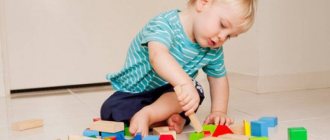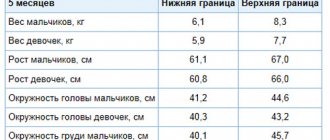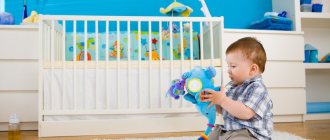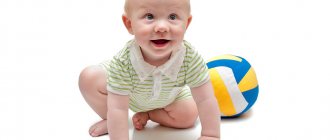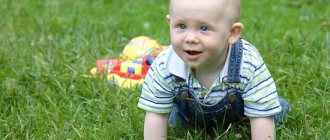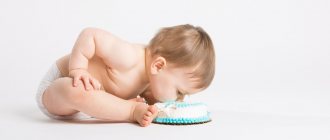Your 8-month-old baby is now a busy little person as he loves to crawl, explore and discover the world - mostly by tasting everything, of course. Many children can already please their parents with their first teeth or first words, while others may just be learning to crawl and not get teeth.
The second half of the first year has begun! Read on to find out what you can expect from your baby's development this month, how to care for him and much more.
Baby parameters
On average, in the eighth month a child gains about 600 grams and grows by two centimeters. The parameters of boys and girls are slightly different from each other, but the difference is small. The weight of a child at 8 months for girls varies between 6.8–8.9 kilograms, boys – 7.1–9.5 kilograms. The height of children at eight months is: girls - 64-70.5 centimeters, boys - 65-71.5 centimeters. Many pediatricians insist on measuring head circumference; the numbers must correspond: boys - 41-45 centimeters, girls - 41-44 centimeters.
When measuring your baby, remember that all children are individual and develop differently. If your baby is a little different from his peers, don’t panic.
Severe anxiety has a detrimental effect on the child. To put your mind at ease, visit a pediatrician; only an experienced specialist will be able to identify developmental defects, if any.
Advice for parents of eight-month-old babies
Babies at 8 months are very active, so right now it is so important to take care of their safety. Mom and dad must remember that the baby cannot be left unattended, because now his instinct of curiosity prevails over the instinct of self-preservation. It is important to remove sharp objects and limit access to the balcony and stove.
You should not force your little one to walk. If he does not stand on his feet, holding on to something, it means that his muscular frame is not yet strong enough for this. Once the musculoskeletal system is ready for vertical movement, have no doubt that your daughter will stand on her feet and will soon walk on her own.
If your daughter has already cut 2 teeth on top and bottom, let the little one chew carrots, apples, cookies, crackers. At the same time, be sure to ensure that the baby does not bite off a large piece and choke.
Don't babysit! Speak correctly, call objects by their proper names, for example “cat” and not “kissy”. This will help you form your speech faster and avoid problems with pronunciation. Read fairy tales, poems, nursery rhymes more often. Even if it seems to you that your little one still understands almost nothing, devote time to reading. Do not doubt that in the future this will have a positive effect on your child’s vocabulary.
Developmental activities should bring not only benefits, but also pleasure. Do not force your child to perform certain tasks, this can only cause dislike for games. Try to study in the first half of the day and only when your daughter is in a good mood. In the afternoon, you can play calm games that do not excite the nervous system.
What should a baby be able to do in the eighth month of life?
A child at 8 months becomes active, sleeps less, and the baby changes significantly compared to the first six months of life. Young parents must necessarily know the basics of child development.
Learn about the signs and symptoms of systemic lupus erythematosus in children.
Instructions for using Immunal children's syrup are described on this page.
Carefully monitor your baby’s behavior and notice small successes:
- some babies begin to crawl at this age, it is difficult to move fully, so the baby’s body is low to the ground;
- smart children know how to sit, others are actively trying to learn this process;
- The child begins to actively roll over in different directions. The baby's development is completely focused on physical development; during this period, injuries and bruises cannot be avoided. The baby's movements are awkward, although they believe that this is not so. Be careful, a baby left for a few seconds can roll off any surface;
- in a crib or stroller, the child can stand up independently, bend his knees, holding onto the railing;
- the baby can independently hold a bottle, a pacifier, and, if necessary, can pick up a fallen object;
- if parents hold the baby under the armpits, he can walk slowly;
- the child feels genuine interest in everything that is happening: throws various objects at the wall, picks them up, examines toys;
- at the age of eight months, the baby actively uses his hands: carefully examines toys and objects, twirls them in his hands, sometimes tastes them;
- The baby is interested in putting small objects into large ones;
- The child’s vision and hearing are formed, the baby reacts violently to quiet sounds. It is undesirable to let your baby sleep in complete silence; such actions will lead to the child waking up due to any rustling sound;
- in most cases, an eight-month-old baby already has baby teeth. If new residents have not yet appeared in the dentition, wait up to a year. Heredity plays a big role; some children grow several teeth at once.
All babies react differently to teething. Do not worry if you notice the following signs: slightly elevated body temperature, non-specific salivation, gums become swollen, the baby puts everything in his mouth, the baby rubs his sore cheek against all objects, even a pillow.
READ ALSO: Correct physical and emotional development of a child at 7 months: what a baby should be able to do, useful tips for parents
How to develop a child?
Scientists have proven that the mental development of children is directly related to their physical development. At any age, it is important to work with the baby, to stimulate his desire to learn new skills. You can use simple exercises for this.
Crawling stimulation
If your daughter is still not crawling, you can try to stimulate this skill through activities in the bathtub. To do this, fill the bath with some water and place the baby on her tummy. Water should be added slowly. This will encourage the girl to rise on her elbows and knees and get on all fours. It is very important to ensure that the child does not drink too much water.
Development of fine motor skills
At eight months, the toddler should already be able to grasp small objects with two fingers and hold them for some time. Activities related to rearranging any small objects (buttons, beans, caps, pins, coins) will help improve this skill.
Show your baby that they can be put in different boxes or in a bottle. This activity will certainly take your fidget for 10-15 minutes.
You might be interested in: When do babies start speaking their first words?
Consequence game
For this activity you will need cubes. Show your daughter what can be built from them, for example, a high tower or a small house. After this, give the child the opportunity to destroy your structure. This will be both educational and fun game. Over time, the daughter will try to build towers on her own.
Balance training
To improve balance, you can make an imitation of a path for your child, for example, put threads on the floor or lay out a path of towels. The child’s task is to walk along it, holding his mother’s hand.
Don’t be upset if your daughter doesn’t succeed, because at this age it’s still quite difficult for her to walk. Keep practicing and every day you will notice progress.
Games with kitchen items
Such activities will be useful not only for the future hostess, but also for her mother, because while the baby is playing with ladle and pots, the mother can easily start cooking. While playing, do not forget about the safety rules. Do not give your child sharp objects and make sure that the baby does not go near the stove.
Peekaboo
Hide any object in front of the baby and ask him to find it. Children usually enjoy playing this game. Over time, you can complicate the task, for example, hide several objects or toys at once. This will develop attentiveness in the daughter and will be a fun activity that brings mother and baby closer together.
Whatever games you play with your child, you must remember that the child constantly needs love and support. Don’t scold your daughter if something doesn’t work out for her, be patient. This will help develop trusting and harmonious relationships.
Special test
To calm your soul, carry out a few simple manipulations to identify deviations in the child’s development and pay attention to them in time to prevent serious pathologies:
- sit with your baby in front of the table, first place bright objects on it. The child should become interested in toys, begin to look at them carefully, and touch them with his hands;
- ignore the baby, a normally developing baby will definitely be offended and cry;
- a baby at 8 months should independently roll over from his back to his tummy, especially for an interesting object;
- if the baby is lying on his back, cover his face with a diaper, the child must free himself from it;
- Give the baby a toy in both hands, then offer another item. Normally, the baby will be puzzled at first, then put aside one toy, making room for another;
- An eight-month-old baby shows special interest in strangers, and fear gradually disappears.
You only need to worry in the following cases:
- the baby does not react to sounds, does not show any emotions even when appearing and communicating with loved ones;
- cannot bring various objects to his mouth;
- the child cannot or does not try to roll over from one side to the other;
- the child does not follow moving objects;
- does not support its weight well in an upright position.
Features of baby development at eight months
This is a difficult period for parents when they need to maintain a balance: giving the baby complete freedom of action in exploring the world around him and at the same time ensuring his safety. The development of a child at 8 months of life is dynamic in all directions: physical, emotional, psychological, and right now it is important for parents to be especially vigilant.
Physical
The daily routine for an 8-month-old baby usually looks like this: 2 hours of wakefulness, 2 hours of sleep, five feedings a day and 10-11 hours of sleep at night.
At this stage, most babies can already boast of several teeth (usually a pair of upper and two lower incisors). Don't worry if the gaps between your teeth seem too large: by age 2, the remaining milk units will fill the empty spaces. There will be 20 of them in total.
Premature babies develop teeth later. You only need to worry if by the age of one year the baby has not erupted a single tooth. The child's growth rate usually slows down at this stage. A table of the height and weight of 8-month-old children, compiled taking into account data from WHO and domestic pediatrics, will help to assess the physical development of the baby.
| Boys | Girls | |||
| WHO data | Data from domestic pediatrics | WHO data | Data from domestic pediatrics | |
| Height (cm) | 66,2-75,1 | 66,8-73,2 | 64,0-73,4 | 66,0-72,6 |
| Weight, kg) | 6,9-10,8 | 7,5-10,1 | 6,3-10,1 | 7,2-9,4 |
| Chest circumference (cm) | 44,3-48,5 | 44,6-47,0 | ||
| Head circumference (cm) | 43,2-45,5 | 42,0-44,7 | ||
The values given in the table should be considered as indicative. All children develop individually. If the child’s parameters fall within the stated boundaries, it means that the baby’s development is proceeding normally.
An important milestone in the physical development of the baby at this stage is crawling. You should not force things by encouraging your child to start walking right away.
This is harmful because he cannot yet hold the body in an upright position, which leads to an asymmetrical load on the musculoskeletal system and creates the preconditions for curvature of the spine. First of all, the baby must master crawling.
This will serve as excellent gymnastics for the uniform development of all muscle groups. The parents’ task is to create all the conditions for active crawling for the baby. Another important point in the physical development of a baby is the ability to sit down and stand up.
The eight-month-old toddler is incredibly active, immensely curious, but so far he has completely no sense of self-preservation. The baby does not realize that the world around him is fraught with all sorts of dangers and the parents’ task at this stage is to protect the baby from troubles.
There should be poisonous, small, sharp, hot objects and things of value out of reach of the child: documents, expensive equipment, etc. Unstable furniture, for example, bookcases, chests of drawers, should be attached to the wall or floor so that the child does not drop them on myself.
In the eighth month, the baby should gain about 0.5 kg in weight and grow by 1.5-2 cm.
Psychological
The eighth month of a baby’s life is marked by intense psychological development. Now the baby can concentrate attention on an object.
Everything that falls into his hands, he examines with interest, knocks, feels, shakes, tastes. If you distract the baby at this moment, after a while he will return to the interrupted activity.
For an 8-month-old child, awareness of constancy is very important, so you should maintain previously developed rituals: daily routine, familiar surroundings. The baby is still very dependent on adults and begins to cry if he loses sight of his mother.
Such anxiety is a normal phenomenon that contributes to the socialization of the child: he will gradually get used to another person with whom he temporarily remains in the absence of his parents. You can trust your baby only to trusted people with whom the baby is familiar. He still regards strangers as a potential danger.
Mental development
The child is actively developing not only at the physiological level, the baby reaches a new level at the mental level:
- understands speech, tries to repeat some words, but those around him hear awkward sounds;
- knows his name, almost always responds to it;
- the baby subtly feels the emotions of the parents, understands facial expressions and gestures. If you scold the baby, he already realizes his guilt;
- The baby recognizes its closest relatives and is most attached to its mother. In its absence, the baby may burst into tears, not because the power source has disappeared, but because of a severance of the emotional connection, or a lack of a sense of security. Some children may develop fear of separation from their parents by the age of seven months;
- attracts your attention in a unique way: grabs your hair, throws toys, screams for no reason;
- the incoherent babble of the baby gradually becomes meaningful: the words mom, dad, baba, which have many vowels, a simple combination, slip through. The child tries to attract the attention of his parents with some syllables;
- an eight-month-old child is ready to be friends with everyone, but does not show initiative;
- the game of hide and seek teaches the child that hidden things do not disappear, they are simply not visible;
- Don’t panic if you notice that your baby often uses his left hand. In the eighth month of life, the left hemisphere develops more than the right. The process is temporary and does not mean that the child is left-handed;
- A child at 8 months begins to be afraid of loud sounds; do not turn on household appliances (hair dryer, washing machine, food processor) near the baby.
What problems might parents face?
Raising children is a responsible and labor-intensive process that requires endurance and patience from mom and dad. Parents of eight-month-old babies often face various problems. Let's look at some of them.
Problems with complementary feeding
The age of 8 months is precisely the period when complementary foods are most often introduced. Not everything goes smoothly here. Children often suffer from allergies to certain foods, for example, milk. Allergies can manifest themselves in the form of skin rashes, stool disorders, colic, and more. In this case, it is necessary to obtain advice from such specialists as a pediatrician, nutritionist, allergist and others. Often, allergies to certain foods go away on their own with age.
Painful teething
The first teeth, as a rule, do not cause severe discomfort to toddlers, but this does not always happen. It often happens that teething is accompanied by an increase in body temperature, upset stool and a general deterioration in the condition of the little fidget.
To alleviate his condition, it is recommended to use teething toys with a cooling effect and pain-relieving gels. Your pediatrician will help you choose them. To normalize body temperature, it is recommended to use syrups based on paracetamol and ibuprofen.
Bad dream
All parents experience sleep disorders in their children sooner or later. Some children wake up 3-4 times during the night and do not sleep well during the day. This may be due to various psychological and physiological factors. To find out the reasons that prevent normal sleep and sleep, you should undergo a comprehensive medical examination. Often, sleep problems are solved after normalization of nutrition and daily routine. Try to put your baby to bed at the same time and be sure to take walks in the fresh air more often.
Read more information about how to properly put your baby to sleep in this article. In it you will find a lot of useful information and tips for parents.
Fear of separation from parents
Many eight-month-old babies do not want to let their mother leave their side even a step, which creates significant inconvenience. As soon as mommy disappears from sight, the child breaks into hysterics. Unfortunately, only time helps to cope with this problem. When the baby begins to grow up, separation from parents will no longer be so scary.
You might be interested in: What children should be able to do in 2.2
Reluctance to receive complementary foods
If the dish that is offered to the baby has a taste and smell that the child does not like, he will not eat it under any pretext. If this happens, you should not insist, it will only cause even greater reluctance.
Try replacing the product you don’t like with another one, and leave this one for later.
Read the article about growth spurts in children under one year old. This knowledge will certainly be useful to you. All the information you need is here.
Proper nutrition
At eight months, a child should be able to drink from a cup independently; during this period it is important to introduce vegetable and fruit purees into the baby’s diet. It is allowed to give one-ingredient cereals or buy ready-made ones, specially prepared for children (they are enriched with milk powder and butter). Start with peach, apple, plum, prunes, gradually add carrots, pumpkin, spinach, potatoes. The last ingredients are quite heavy for a child’s body, combine it with cauliflower and zucchini.
At the end of the month, give your child a yolk. If the first teeth begin to appear, give the baby special cookies, they have a positive effect on tooth growth.
READ ALSO: Basic child development skills at 3 months: what should a baby be able to do? Norm of physiological and psycho-emotional development
What to feed a baby at 8 months? Breastfed children should adhere to the following diet:
- 7 hours – approximately 200 ml of milk;
- 11 hours – any porridge (150 grams), additionally given fruit, vegetable puree, juice or compote;
- 15 hours – include vegetable puree (100 grams), meat puree, juice or compote in your baby’s diet;
- 19 hours – 200 grams of breast milk, a special cookie;
- 23 hours – breast milk (200 grams).
Advice for young mothers
- Praise the child. Now the baby is learning and exploring the world, he reacts emotionally to any of his achievements, even gets upset if something doesn’t work out. Praise him more often, this will contribute to the development of determination.
- The authority of parents. The child is already trying to manipulate your feelings. It is very important to find a “middle ground” in communication so that he understands that what his mother said is the law, but at the same time does not lose interest in further acquaintance with the world.
- Organization of space. The child has become mobile and active, it is necessary to organize a fairly large free space in the apartment for joint games. To avoid injury, remove all unstable objects.
- Talk to your child. Maintaining a dialogue with the baby contributes to the rapid development of his speech.
- Revision required. Remove all small objects and things you need from where your baby can reach them.
- Play more. It is the game that stimulates the child to action, the ability to think, and overcome difficulties. No matter how tired you are during the day, still devote at least 1-2 hours to playing with your child.
- Goodbye bottle. It's time to introduce your child to the mug. At first you won’t be able to drink from it, but over time the baby will master these skills and it will be interesting for him.
- Let's chew. Do not grind food in a blender, mash it with a fork and teach your child to eat solid food. After all, chewing reflexes have a beneficial effect on the speech apparatus, and the process of chewing food helps strengthen the baby’s gums and teeth.
No matter how fast your child develops, do not compare him with his peers. Norms are only average indicators, and individual ones depend on the child himself and the inherited genome. You can read what awaits you and your baby next month here.
Recommendations for caring for your child
If you have baby teeth, consult your doctor about caring for them. Be sure to choose a good brush and paste, and regularly clean the baby’s cavity from pathogenic bacteria. Healthy baby teeth are the key to excellent dentition in the future. New foods containing sugar appear in the baby’s diet; they can negatively affect fragile enamel.
Drinking boiled water after each meal will help prevent caries; the baby cannot yet rinse his mouth on his own. Children's stores sell special "drinking bowls" for children with two handles. A little man can drink water on his own, holding the container with two handles.
Baby's vision
Active development has a positive effect on the baby’s vision. By the eighth month, the child distinguishes more and more colors and shapes, recognizes objects located in the distance. The baby looks at objects of interest from different angles, evaluates the shape, color, distance to the object. Develop your baby's abilities with interesting games.
Look at a selection of didactic games for developing memory and attention in children.
The rules for the use and dosage of Tizin drops for children for a runny nose are described in this article.
On the page https://razvitie-malysha.com/novorozhdennye/aksessuary/kolyaska-osen-zima.html read tips on which stroller is best to choose for a newborn for the winter.
What does a 7-8 month old baby need?
- Mom and Dad Society
At this age, it is beneficial for a baby to be surrounded by his family most of the time and do simple, safe activities with mom and dad. Therefore, try to have breakfast or dinner with the whole family at one table at least once a day. Place him in a highchair at a common table and serve him food as if he were an adult. Arrange the dishes for dad, mom and baby one by one, provide cutlery and demonstrate by example how to eat and drink. Before eating, be sure to wash your child’s hands, and after eating, carefully wipe his mouth with a napkin. Very soon the baby will learn the necessary skills and will call you to order if you deviate from the correct sequence of actions.
- The right toys
It's time to offer your baby toys that imitate household items. You can buy a toy phone, a TV remote control, or car keys. With great pleasure, the child will play with real objects, helping you in his own way. Do not prohibit, show how to use this or that thing correctly, and remove potentially dangerous small, sharp, hot, loose and other parts away. For information on what safety rules should be followed when a baby is growing up in the house, read the article Safety in the Home.
For such games, you should choose and buy sets of toys for role-playing games in Mom’s Store, as well as take care of children’s locks or safety devices.
- Breast-feeding
Despite the fact that you have most likely already introduced the first complementary foods, you need to continue breastfeeding. The baby needs not only the necessary substances that protect him at this stage of development, but also the proximity of his mother, the smell of her body, and warmth.
At birth, the baby is physically separated from his mother, but this does not mean that he is free mentally. The baby needs her company, affection, approval, constant tactile contact and protection. In this case, the mother's breast acts as a kind of connection point that continues to connect the child with the mother and maintains a sense of unity between them many times a day.
Now the feeding process takes on completely new colors. The child plays around, feels, pulls on his chest, tries to eat while sitting, standing, sticking out his butt. Having noticed familiar, pleasant circles under clothes, the baby persistently strives to extract “its charm” and start eating. The prospect of being naked in the most unexpected places is not always included in the plans of a young mother, and the first quarrels can overshadow the tender friendship between the mother and the persistent baby.
It must be said that breastfeeding in public places is a completely normal and healthy phenomenon. There is nothing wrong with this, so if you see that it is necessary to feed your baby, do not hesitate, sit down on a comfortable bench and feed calmly. Of course, you can see judgmental glances and even hear not the most pleasant comments about yourself, but this is a demonstration of the internal complexes and ignorance of other people. You don’t go “topless” and don’t behave provocatively. You are a happy mother who feeds a wonderful child, and everything else doesn’t matter.
If you experience discomfort, purchase special capes that cover your breasts at Mom's Store, or use comfortable muslin diapers. They will not allow others to violate the sacrament of breastfeeding.
Educational games
Some activities have a positive effect on the baby, keep him busy for a long time, and help develop the necessary skills:
- teach your child to clap their hands, wave their arms, point their fingers at different objects;
- purchase several small toys (allowed for play by children of seven months), they develop fine motor skills, which has a positive effect on the baby’s skills;
- While walking, the baby probably made friends. Maximize your communication time with other children; playing in a group speeds up the child’s development process.
Watch an interesting video for parents about the development of an eight-month-old baby:

